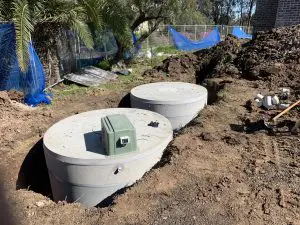All You Need to Know About Septic Tanks in Sydney
When it comes to wastewater management in areas without access to centralized sewer systems, septic tanks play a crucial role in maintaining a clean and healthy environment.
If you live in NSW and are considering a septic system for your property, this blog will provide you with a comprehensive understanding of septic tanks, their features, and the numerous benefits they offer.
What is a Septic Tank?
A septic tank is an underground, self-contained wastewater treatment system commonly used in areas where municipal sewers are not available. It consists of a large concrete or plastic tank that efficiently collects, treats, and disposes of domestic wastewater from toilets, bathrooms, kitchens, and laundry facilities on residential and commercial properties.
Septic tanks contribute to a more sustainable and eco-friendly approach to wastewater management. After the wastewater undergoes partial treatment in the septic tank, it flows into the drain field, where the surrounding soil acts as a natural filter. As the effluent percolates through the soil, it goes through a biological and chemical process that removes harmful bacteria, viruses, and excess nutrients such as nitrogen and phosphorus. This process, known as soil-based treatment, significantly reduces the environmental impact of wastewater discharge, protecting nearby water bodies and groundwater from contamination. By choosing a septic tank system, homeowners play an active role in preserving the local environment.
Septic tanks operate without the need for electricity or a continuous power supply, making them inherently energy-efficient. Unlike centralized sewer systems that require significant amounts of electricity to transport wastewater to treatment plants, septic tanks rely on gravity and natural biological processes. As a result, the energy consumption associated with wastewater treatment is minimal, leading to a reduced carbon footprint. This energy efficiency aligns with sustainable practices and contributes to the overall conservation of resources.
Cost-Effective
1. Properly designed and maintained septic tanks typically have lower maintenance costs compared to traditional sewer systems. Routine maintenance mainly involves periodic inspections, pumping out accumulated solids, and ensuring the system’s components are functioning correctly. With the help of professional septic tank services, homeowners can identify and address potential issues before they escalate, avoiding costly repairs or replacements. Regular maintenance extends the lifespan of the septic system, ultimately saving money in the long run.
2. One of the most significant financial benefits of having a septic tank is the absence of monthly sewer fees. In areas serviced by centralized sewer systems, property owners pay regular fees for the collection and treatment of wastewater. By opting for a septic tank, homeowners eliminate this recurring expense, putting more control over their utility costs in their hands. This financial independence is particularly appealing to those seeking ways to reduce their monthly expenses and achieve long-term cost savings.
Independence and Reliability
1. Septic tanks offer a reliable wastewater management solution, especially in areas where access to municipal sewer services may be limited or unavailable. Properties located in rural or remote regions can benefit greatly from the autonomy provided by septic tanks. Even in areas with existing sewer networks, some properties may face challenges connecting to them due to terrain or logistical constraints. In such cases, a septic tank becomes an indispensable and self-sufficient wastewater treatment option.
2. Unlike centralized sewage treatment plants that heavily rely on electricity, septic tanks continue to operate efficiently during power outages. The natural anaerobic treatment process inside the tank does not require electricity to function, ensuring uninterrupted wastewater treatment during adverse weather conditions or power failures. This reliability is especially crucial in areas prone to severe weather events or regions with unreliable power infrastructure, providing homeowners with peace of mind knowing their wastewater needs are continually met.
Longevity and Durability
1. Properly designed, installed, and maintained septic tanks can last for several decades. Their robust construction using materials such as concrete or high-density polyethylene ensures they can withstand the weight of the soil above and the internal pressure of wastewater. Regular pumping of accumulated solids, adhering to proper usage guidelines, and periodic inspections by professionals contribute to extending the septic tank’s lifespan, ultimately offering a reliable, long-term solution for wastewater treatment.
2. Septic tanks are built to be resilient against various environmental factors that might impact their functionality. For instance, they are designed to resist the intrusion of tree roots, preventing potential damage to the system. Additionally, their underground placement shields them from the effects of weather elements, temperature fluctuations, and physical damage that may occur above ground. This durability ensures that the septic tank remains efficient and operational, even under challenging conditions, minimizing the need for repairs and replacements.
Customizable
1. Septic tank systems can be customized to suit various soil types commonly found across Sydney, NSW. Soil characteristics, such as texture, porosity, and drainage capacity, influence the overall effectiveness of the drain field in treating and dispersing effluent. Proper soil analysis is essential in determining the appropriate design of the septic system, ensuring optimal treatment, and preventing potential issues like clogging or groundwater contamination.
2. Septic tanks are highly versatile and can be tailored to meet the specific wastewater management needs of both residential properties and commercial establishments. Whether it’s a small suburban home, a large estate, or a commercial facility, septic tanks can be designed to accommodate varying waste volumes and usage patterns. Their adaptability makes them an ideal choice for properties with different sizes and applications, providing an efficient and reliable solution for wastewater treatment.
By embracing the numerous features and benefits of septic tanks, property owners in Sydney, NSW, can make a positive impact on their environment, finances, and overall quality of life. Septic tanks offer an environmentally-friendly approach to wastewater treatment through natural filtration and energy-efficient anaerobic processes.
Moreover, the cost-effectiveness, reliability, and durability of septic tanks ensure they remain a viable long-term solution for properties, whether located in rural or urban settings. Their customizability further makes them a versatile choice for various soil types and property types, catering to the specific needs of residential and commercial users alike.
Choosing a septic tank system, along with regular maintenance and professional guidance, allows homeowners to take charge of their wastewater management responsibly and contribute to a cleaner and healthier community for generations to come. For a Free Quote and Sizing on all Septic Tanks Made in Australia call the team at Eco-Septic on 1800 808 135
Related Posts
- Tank vs. Sewer System: Which Is Better for Sydney Homes?
- Home Sewage Treatment Plants: What They Are And How Do They Work?
- How Do Grey Water Recycling Systems Work
- Navigating Wastewater Solutions: A Guide to the Application Process Through NSW Councils
- The Economics of Septic Systems: Cost Savings and Long-Term Investments
- Choosing the Right Septic Tank Additives: What Works and What to Avoid
- Below-Ground Septic Tanks: Sydney’s Septic Solutions
- Reinventing the Septic Tank for the 21st Century




